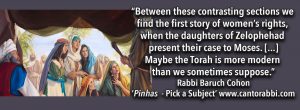“Pinhas” – Numbers 25:10 – 30:1 – Pick a subject – by Rabbi Baruch Cohon
This week’s reading, named after Pinhas – Phineas, son of Elazar son of Aaron – contains enough different subjects for at least 5 messages.
We learn that, as a reward for his violent action in last week’s reading, Pinhas is granted permanent priesthood for himself and his descendants. Many commentators wrestle with that story.
Then we witness a census of the Israelite people, the first one in 40 years, to determine if after those desert years there are enough fighters to take over the Holy Land.
We will see the aging Moses designate Joshua to be his successor. And we will read the description of all the offerings, daily and seasonal – a section that is quoted on all the occasions of the Jewish calendar.
So this Dvar Torah will discuss none of the above.
Between these contrasting sections we find the first story of women’s rights, when the daughters of Zelophehad present their case to Moses. Even though the Israelites were still east of the Jordan, conversation in the camp undoubtedly stressed questions about how the Holy Land would be allocated once they settled there. Ownership questions, and inevitably inheritance questions. When the father of a family died, his property would customarily pass to his son, or sons. But Zelophehad had no sons. He had daughters. If no male heirs are available, would his inheritance be lost to his tribe? So here they come, Mahlah, Noa, Khogla, Milka and Tirtza, to tell Moses that “our father died in the desert. He was not part of Korach’s rebellion. He died in his own sin. Why should his name be lost from among his family, just because he had no sons? Give us a possession among our father’s brothers.”
MeToo – some 3,000 years ago?
Moses takes their case into the Tabernacle for some Divine help. Here the Midrash offers a beautiful thought. This, it says, is what Zelophehad’s daughters wanted. They knew that a human father might prefer his son over his daughter. But the Creator extends his love equally to all His children! And indeed, the very next section in our reading sets up the order of inheritance: son, daughter, brothers, uncles, and then the closest remaining relative. Only later in the Torah does Moses instruct Zelophehad’s daughters to marry men from their own tribe, so their inheritance will remain in the tribal territory.
Women’s inheritance rights, in Moses’ time. Many centuries later, a rabbi named Shimon ben Shetakh spelled out a woman’s marriage rights in the K’tubah, the sacred document we still present to the bride at every Jewish wedding. Yes, Jewish women always had rights.
Limited? Yes. But just compare these rights to some contemporary ones, like Sharia law, for example, where a woman has virtually no rights at all. Except, as of now, driving a car.
Maybe the Torah is more modern than we sometimes suppose.



